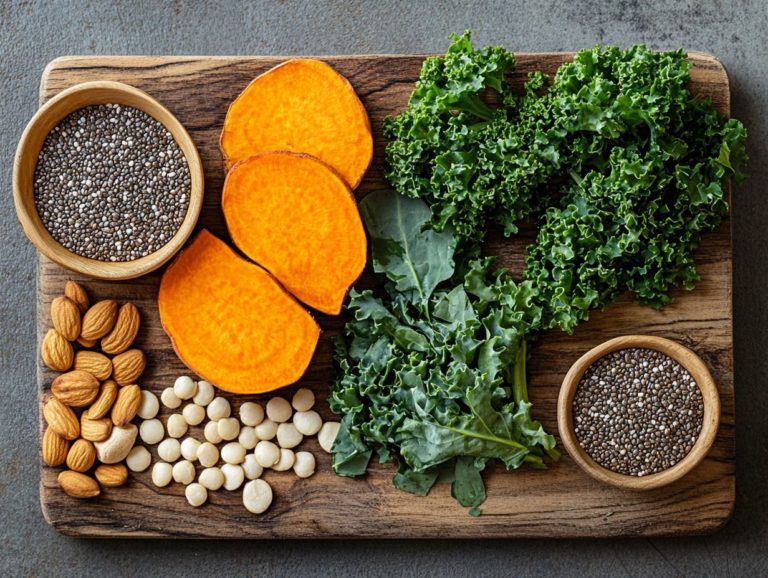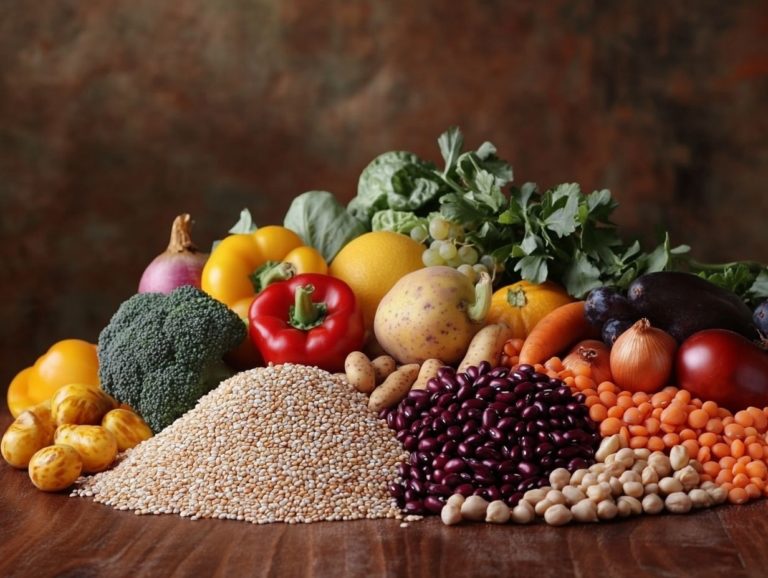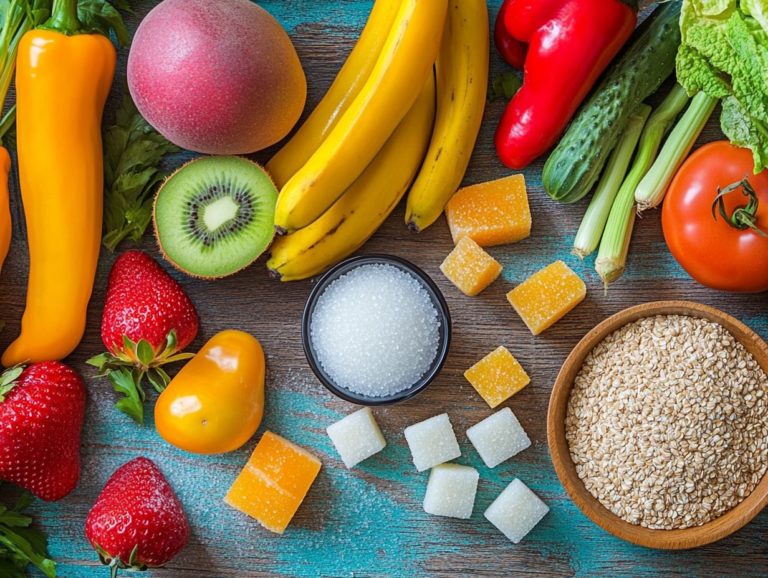5 Healthy Fats for a Holistic Diet
In today’s health-conscious world, the term “fat” often has a negative meaning. However, not all fats are the same. Healthy fats are essential for your diet and provide many benefits for your overall well-being.
From avocados to fatty fish, some fats can improve heart health, support brain function, and even help with weight management.
This article explores five incredible sources of healthy fats. We highlight their benefits and share practical tips to add them to your meals.
Contents
- Key Takeaways:
- 1. Avocado
- 2. Olive Oil
- 3. Nuts and Seeds
- 4. Fatty Fish
- 5. Coconut Oil
- What Are Healthy Fats and Why Are They Important?
- Frequently Asked Questions
- What are 5 healthy fats you should include in a holistic diet?
- Why are these 5 fats considered healthy for a holistic diet?
- How can avocado be incorporated into a holistic diet?
- Can nuts and seeds be eaten in large quantities as part of a holistic diet?
- What makes fatty fish a healthy fat for a holistic diet?
- Is coconut oil a healthier alternative to other oils for a holistic diet?
Key Takeaways:
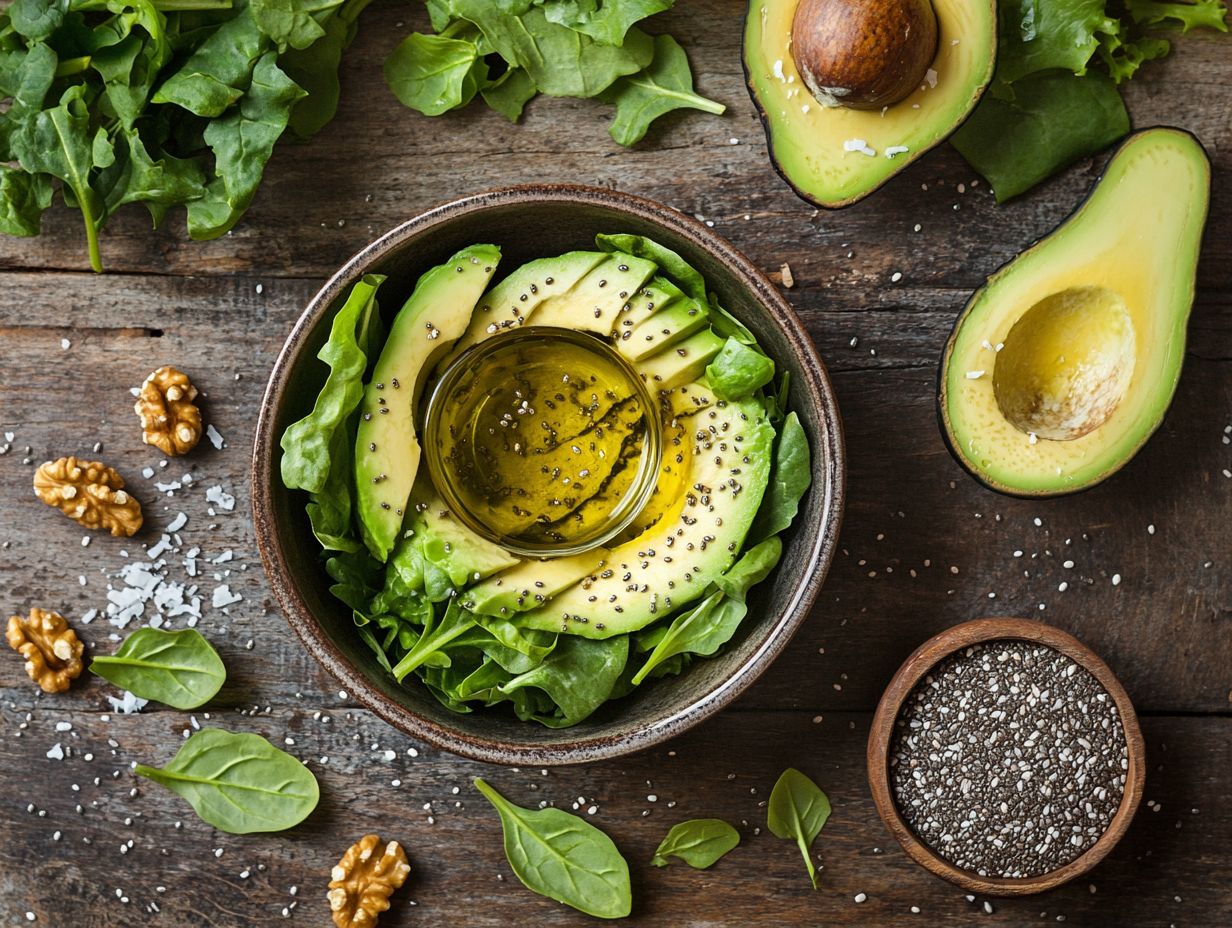
Avocado is a versatile source of healthy fats that fits into any meal.
Olive oil is heart-healthy and perfect for cooking, dressings, and dips.
Nuts and seeds are packed with healthy fats and can easily be added to salads or smoothies.
1. Avocado
Avocado is often called a superfood for good reason. Its healthy fats, especially omega-3 fatty acids, support heart health.
This fruit enhances dishes with its creamy flavor and helps with weight management and cholesterol levels.
Avocado is incredibly versatile. Blend it into smoothies for a creamy texture or toss it into salads for a rich flavor.
Use avocado as a base for spreads like guacamole, which pairs beautifully with whole-grain chips or veggies.
The monounsaturated fats in avocado help you feel full and manage cravings, making your journey to a healthier lifestyle enjoyable.
2. Olive Oil
Olive oil is celebrated for its health benefits, especially as a source of healthy fats rich in antioxidants. It s a staple in diets promoting heart health.
This liquid gold enhances flavors and is key for maintaining healthy cholesterol levels.
Among different types, extra virgin olive oil stands out due to its cold-pressing method, which preserves nutrients and flavor.
Drizzle it over salads or use it to saut vegetables for added taste and heart health benefits.
Add olive oil to pasta dishes or as a dip for whole-grain bread to boost your nutrient intake easily.
3. Nuts and Seeds
Nuts and seeds are excellent sources of healthy fats and packed with nutrients and quality proteins. They make perfect snacks for a balanced diet.
Almonds are high in vitamin E, walnuts are rich in omega-3, and pumpkin seeds provide magnesium and zinc for bone health and immunity.
Add these nutritious snacks to smoothies, salads, or yogurt. For a quick snack, grab a handful of mixed nuts or seeds.
Remember to control your portions; even healthy fats can cause weight gain if eaten in excess.
4. Fatty Fish

Fatty fish like salmon, mackerel, and sardines are great sources of omega-3s. They promote heart health and improve your cholesterol profile.
These fish also contain high-quality proteins. This makes them a vital part of a nutrient-rich diet.
Grilling salmon with lemon and herbs creates a tasty main dish. Smoked mackerel adds a burst of flavor to salads.
Packed sardines in olive oil are a quick and nutritious topping for wraps or pasta dishes.
Add these fish to your meals each week for their great flavors and significant health benefits.
5. Coconut Oil
Coconut oil is a popular ingredient in healthy diets. It helps with weight management and improves cholesterol levels.
Use this oil for baking or frying. It adds richness and flavor to your dishes without sacrificing health.
Incorporating coconut oil into your meals offers a tasty alternative to traditional oils. The medium-chain triglycerides in it may boost your energy and metabolism.
Remember, moderation is key. Pairing coconut oil with other healthy fats like olive oil can create a balanced diet.
What Are Healthy Fats and Why Are They Important?
Healthy fats are crucial for a balanced diet. They include omega-3 fatty acids, which support heart health and cholesterol levels.
These fats provide energy and help with nutrient absorption. They are also important for regulating inflammation.
Adding healthy fats can help with weight management and improve your meals’ nutritional quality. Understanding different types of fats is essential.
Limit saturated fats from red meat and dairy, as they may raise cholesterol. Unsaturated fats like those in avocados and olive oil are beneficial for your heart.
Avoid trans fats found in processed foods, as they contribute to heart disease. A balanced intake of healthy fats supports brain function and overall vitality.
What Are Some Other Sources of Healthy Fats?
Besides avocados, olive oil, and fatty fish, you ll find a treasure trove of healthy fats just waiting to be embraced in your diet. Think high-fat foods like full-fat yogurt, rich dairy products, and even dark chocolate. These delightful options not only bring healthy fats to the table but also deliver a burst of flavor. They transform your snacking into a satisfying and nutritious affair.
By weaving a variety of these foods into your meals, you’re enhancing the health benefits of a balanced diet while indulging in delicious treats.
Nuts and seeds, such as almonds, walnuts, chia seeds, and flaxseeds, stand out as exceptional sources of omega-3 fatty acids and fiber. They can be effortlessly sprinkled into your smoothies, tossed into salads, or mixed into oatmeal, adding both crunch and essential nutrients.
Nut butters, like almond or peanut butter, offer a creamy texture that s perfect for spreading on whole-grain toast or pairing with crisp apple slices.
And let s not overlook coconut products. Whether it s coconut oil or unsweetened shredded coconut, they can infuse your dishes with a delightful tropical flair.
With such a rich array of options at your fingertips, indulging in healthy fats can be both a pleasurable and beneficial experience for anyone looking to optimize their diet.
How Can Healthy Fats Benefit Our Health?
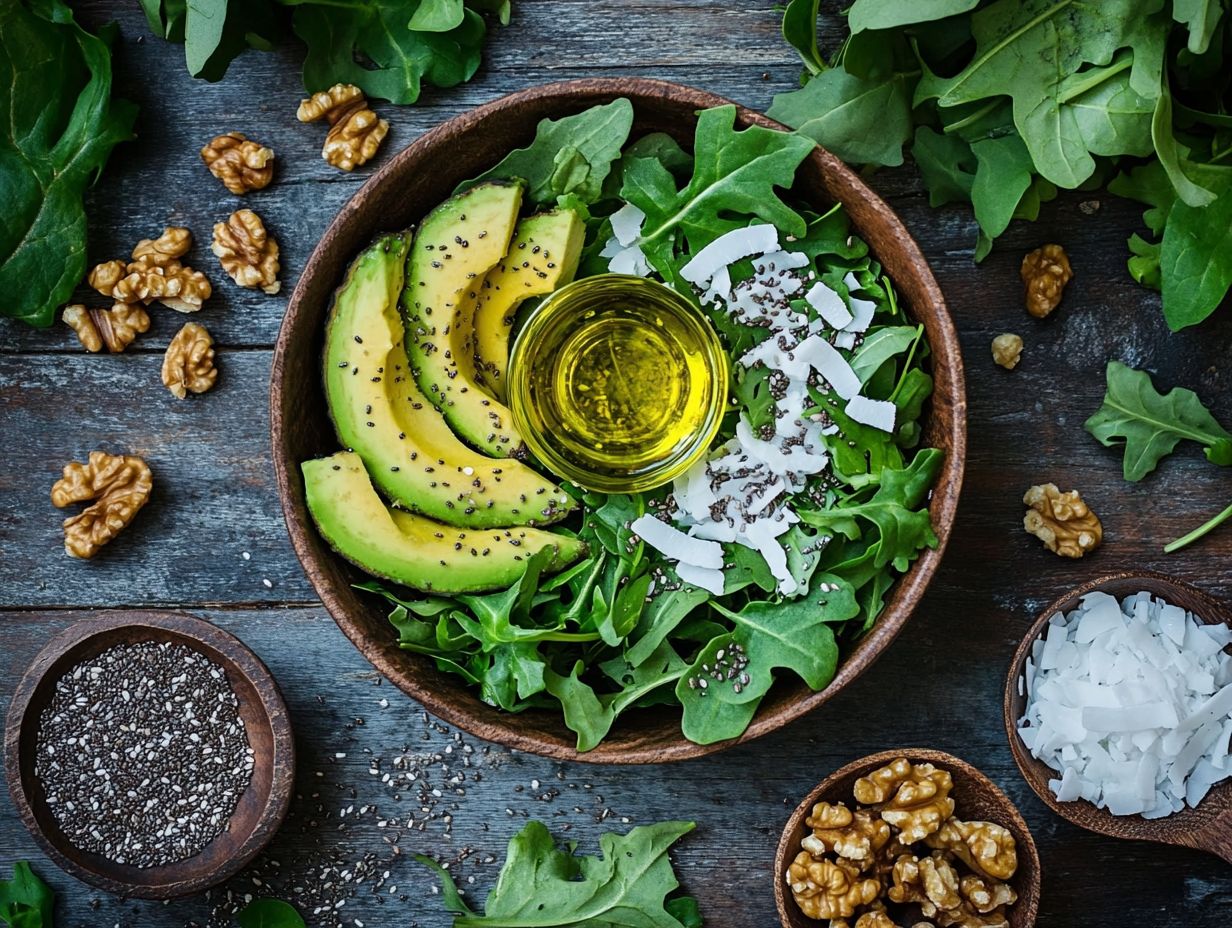
Adding healthy fats to your meals can transform your health and energize your life! These fats positively impact heart health, support weight management, and improve cholesterol profiles.
They aren t just extras; they serve as essential building blocks for cellular structure and function, providing energy and aiding in the absorption of fat-soluble vitamins. Choose high-quality protein sources with your healthy fats today and unlock a healthier you!
Healthy fats play a crucial role in reducing the risk of heart disease by lowering triglyceride levels and boosting HDL cholesterol, often referred to as the good cholesterol. Research published in the American Journal of Clinical Nutrition highlights the significance of omega-3 fatty acids found in fish like salmon and flaxseeds in fighting inflammation and promoting heart health.
Including good fats, such as those from avocados and nuts, is linked to improved overall health, helping to maintain balanced blood sugar levels and supporting effective weight management.
Experts stress that these fats are vital for brain health. Studies suggest a strong connection between consuming healthy fats and a decreased risk of cognitive decline, including conditions like Alzheimer s disease. Embracing these nutritious fats could truly be a game-changer for your health.
What Are the Recommended Amounts of Healthy Fats in a Diet?
Understanding the recommended amounts of healthy fats in your diet is essential for maintaining overall health. Current guidelines suggest that fats should make up 20-35% of your total daily caloric intake, emphasizing the importance of healthy fats to support weight management and optimal cholesterol levels.
It’s vital to strike a balance in the types of fats you consume, ensuring that the majority come from sources rich in monounsaturated and polyunsaturated fats while keeping saturated and trans fats to a minimum.
By adhering to these guidelines, you can seamlessly incorporate healthy fats into your diet and reap their benefits. To elevate your health further, the American Heart Association recommends keeping saturated fat intake below 6% of your total daily calories.
You can achieve this by thoughtfully selecting lean meats, choosing low-fat dairy options, and incorporating more plant-based oils like olive or canola into your meal plans.
Tracking your daily fat consumption can be made simple with mobile apps or nutritional food diaries, which allow you to monitor your intake and make adjustments as needed.
Including a diverse array of foods such as avocados, nuts, seeds, and fatty fish in your daily meals ensures a balanced intake of essential fatty acids, contributing to long-term heart health and overall well-being.
Start adding healthy fats to your meals now and feel the difference! Share your experiences or tips on including healthy fats in your diet.
How Can One Incorporate Healthy Fats into Their Diet?
Incorporating healthy fats into your diet can be a delightful experience. It effortlessly blends enjoyment with nutrition. Consider making simple swaps, like using olive oil instead of butter. You can also opt for high-fat foods such as nuts for a nutritious snack.
These small yet impactful adjustments can significantly enhance your heart health and overall well-being. They ensure you get enough of those beneficial fats. Embrace creativity in the kitchen and savor these delicious options. Elevate your meals and snacks to a new realm of healthfulness!
Think about adding creamy avocado to your morning toast. You can also blend it into smoothies for that perfect texture.
Another effortless method is to sprinkle chia seeds or flaxseeds onto your yogurt or oatmeal. This boosts both flavor and nutrition. When cooking, reach for avocado oil, which has a higher smoke point, making it perfect for saut ing veggies.
For quick snacks, try mixing almond butter with apple slices. You might also explore nut-based energy bars that satisfy cravings while packing in essential nutrients. With just a few thoughtful adjustments, anyone can indulge in a delicious, healthier diet that nourishes the body and delights the senses.
What Are the Risks of Consuming Too Much or Too Little Healthy Fats?
While healthy fats are essential for a balanced diet, it’s crucial to understand the risks associated with both excessive and insufficient consumption. Too much can lead to weight gain and negatively impact your cholesterol levels. On the other hand, too little can result in nutrient deficiencies that hinder overall well-being.
Striking the right balance is key. Healthy fats are vital for providing energy and aiding in the absorption of fat-soluble vitamins. Maintain a mindful approach to your fat intake and support your health!
This delicate line between overconsumption and underconsumption can significantly influence your cardiovascular health, cognitive function, and metabolic processes. Diets high in fats found in processed foods may elevate your risk of heart disease. Meanwhile, a deficiency in omega-3 fatty acids can adversely affect brain development and mental health, particularly in children and adolescents.
To find the right balance, incorporate a variety of healthy fat sources into your meals. Here are some delicious healthy fats you can enjoy:
- Avocados
- Nuts
- Olive oil
Be mindful of portion sizes. By reading nutrition labels and educating yourself about the different types of fats, you enable yourself to make healthier choices. This ensures your body reaps the benefits without falling into the traps of excessive or insufficient fat intake.
Frequently Asked Questions
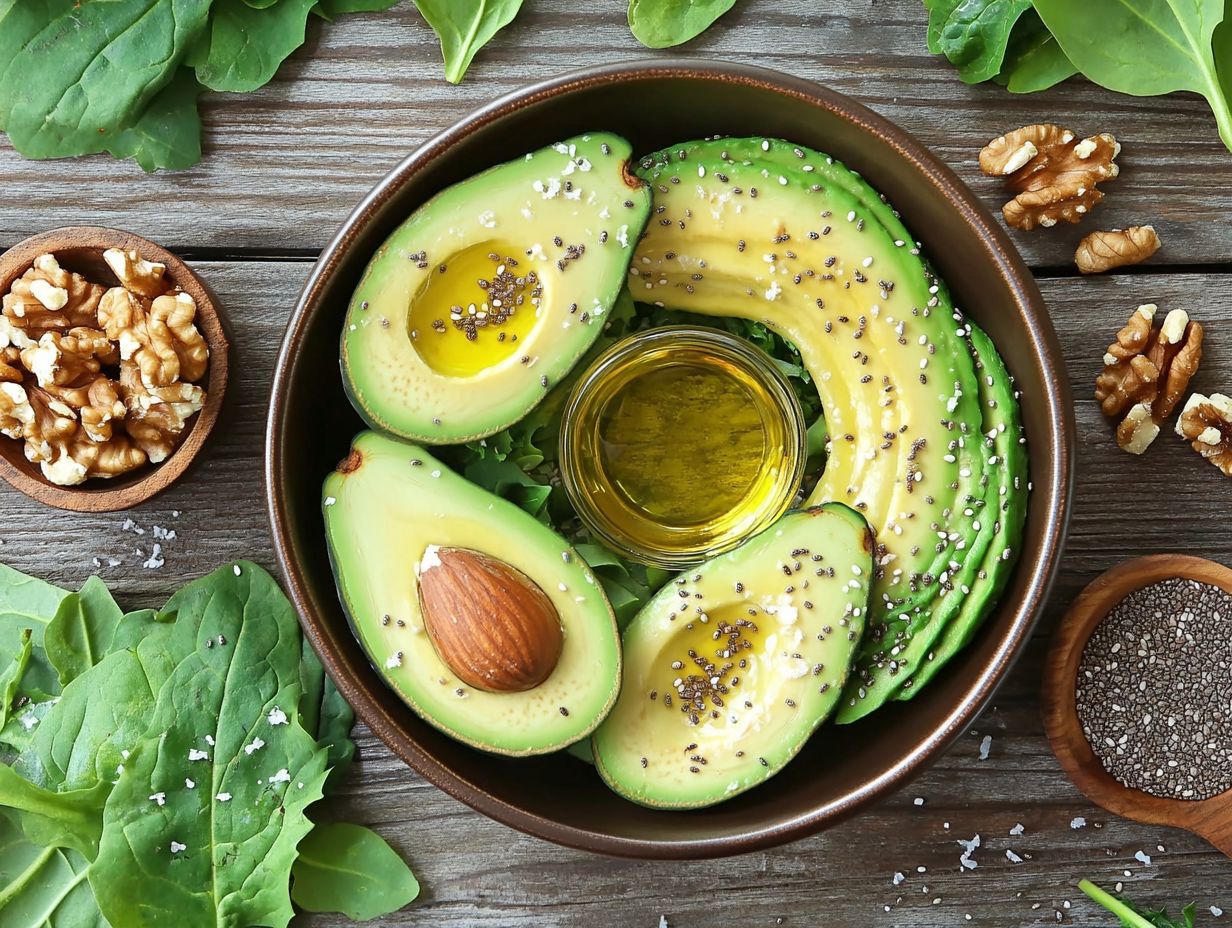
What are 5 healthy fats you should include in a holistic diet?
The 5 healthy fats recommended for a holistic diet are avocado, extra virgin olive oil, nuts and seeds, fatty fish, and coconut oil.
Why are these 5 fats considered healthy for a holistic diet?
These 5 fats are considered healthy because they are rich in essential nutrients, have anti-inflammatory properties, and can help improve heart health.
How can avocado be incorporated into a holistic diet?
Avocado can be easily added to salads, used to make guacamole, or spread on toast or sandwiches.
Can nuts and seeds be eaten in large quantities as part of a holistic diet?
While nuts and seeds are healthy, they should still be consumed in moderation as they are high in calories. A handful a day is recommended.
What makes fatty fish a healthy fat for a holistic diet?
Fatty fish, such as salmon and tuna, are rich in omega-3 fatty acids, which have numerous health benefits including reducing inflammation and improving brain function.
Is coconut oil a healthier alternative to other oils for a holistic diet?
Coconut oil is a healthier alternative for cooking as it has a high smoke point and is less likely to turn rancid. However, it should still be consumed in moderation as it is high in saturated fat.
Why not start by adding avocado to your meals this week?



